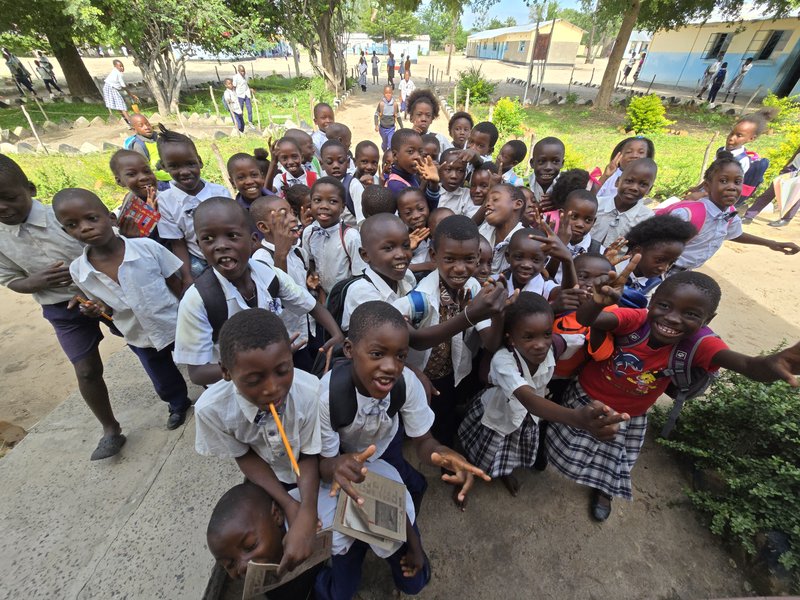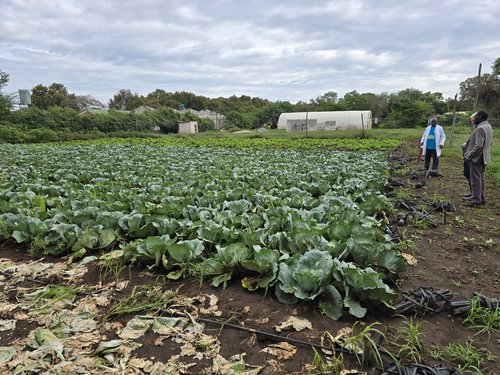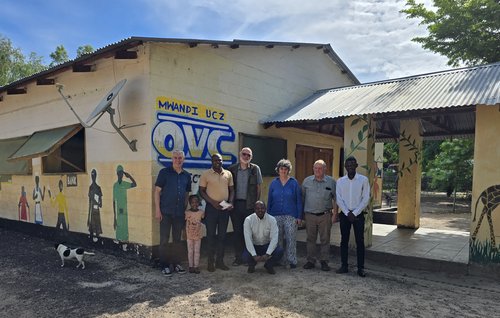Education in Zambia creates opportunity and hope
24 March 2025
24 March 2025
At the beginning of the year, the President-designate of Methodist Church in Britain, the Revd Richard Andrew, visited the United Church of Zambia to attend the 60th Anniversary celebration of the establishment of the Church. Amongst the Institutions and communities that he visited were three schools that are representative of the types of Institutions commonly found everywhere across the Continent.
As in much of Africa, 62% of the population in Zambia are under 25 years old. And of the 75% of these young people who will ultimately go into agriculture, only a quarter of them will achieve anything more than a subsistence living. This demographic is partly why unemployment levels are so high, development goals are so important, and why effective, holistic education is at the heart of Methodist ministry in the country and across Africa.
The United Church of Zambia manages 17 grant-aided schools across the country. These are communities of faith and learning whose educational vision is to provide facilities for the attainment of high quality education and to impart moral spiritual values and life-skills in accordance with Christian teachings and values. The Principal of Chipembi Girls’ School said: “Our purpose is to help all pupils develop holistically, mind, body and soul to their fullest potential in a safe, secure and loving educational environment.”

The three schools visited are representative of this ministry:
Chipembi Girls’ Secondary School
Situated in a rural area north-east of Lusaka, the Methodist Chipembi Girls’ Secondary School, founded in 1926, is a flagship of quality holistic education, listed in 2025 as one of the best Boarding Schools in Zambia. Under the Head Teacher, Albert Chituku, who has won national recognition for his educational achievements with the school, the school aims to empower local children with a holistic quality education that is formative, transformative and provides functional skills for all its’ pupils. The school currently has 630 girls on role from all across Zambia.
In the education provided, skills development has been prioritised over content knowledge – and both are provided to a high standard. Given that 70% of Zambian children live in an agricultural context and will go into agriculture, agricultural training and production has been prioritised for all pupils. And climate change is having a devastating impact on the environment. The school therefore seeks to provide an education that makes children both knowledgeable and capable of dealing with the changing environment. And in a context in which unemployment stands at 29%, agriculture is the key driver for youth job creation and Africa’s largest employer.

Due to the quality of its’ innovative agricultural education, which includes vegetable and fish farming, livestock and chicken rearing and the use of environmentally friendly agricultural techniques, Chipembi Girls’ School became in 2023 the first school in the world to host World Food Day. Amongst its’ practices, it trains pupils in the skills of regenerative agriculture, drip irrigation and hydroponics. The Head Teacher, Albert Chutuku said: “Whilst maintaining best practice in all things, we seek new ways of doing things effectively. We are constantly learning what methods of education we need to discard and models for moving forward that will enhance best practice in all elements of the girls’ education.”
Chipembi is one of the most inspiring educational Institutions that I have visited in Africa both for the quality and breadth of education that is provided and for the evident well-being of the staff and pupils which remains a high priority for the school management.
Mwandi Mission School, Western Zambia.

Situated at Mwandi Mission, on the Zambesi River, three hours east of Livingstone, Mwandi Primary School has 1220 children on roll from the surrounding district. Due to limited classroom capacity, the school has three educational ‘shifts’ for different years and like many schools in Zambia, there is a move to encourage both academic and vocational pathways in education. Classes are taught in English in order to promote better employment prospects and teaching methods increasingly include practical application rather than simply learning ‘by rote’. Christian education and Christian values are also taught and remain central in seeking to instil these values within local culture and society.
Kafue Boys School
Kafue Boys’ Boarding School was established in 1965 at the Kafue Methodist Mission, which itself was founded in the 1890s. Originally a Skills Training Centre, it was converted into a Secondary School and now houses 650 boarders. The site sits on 98 hectares of land, much of which is unused, but some of which is used for agricultural training and education.
There are 38 teaching staff and 19 support staff. Boarding fees, including education and food are £107 per term. The school offers 10 scholarships per year for vulnerable children. The pass rate in exams is 100% and 20-25% of students go on to University. As in all institutions throughout Zambia, power supply is a perpetual challenge. The school therefore runs on solar power.
Summary
Methodist Schools in Zambia have served the country for over 60 years and this tradition of providing quality education at Early Childhood Education, Primary , Secondary and tertirary education levels continues. Despite the schools often serving areas of significant social deprivation, UCZ Schools make an important contribution to narrowing the attainment gap, raising aspirations and improving the employment and economic prospects of our pupils. Many former pupils from UCZ Mission Schools have gone on to play significant roles in Zambian society and beyond, sub-regionally and globally, transmitting the values and virtues that they have acquired through their Mission education – an education that is replicated in Methodist Mission Schools across the continent.
Andrew Ashdown
Partnership Coordinator for Africa
Global Relationships Team.